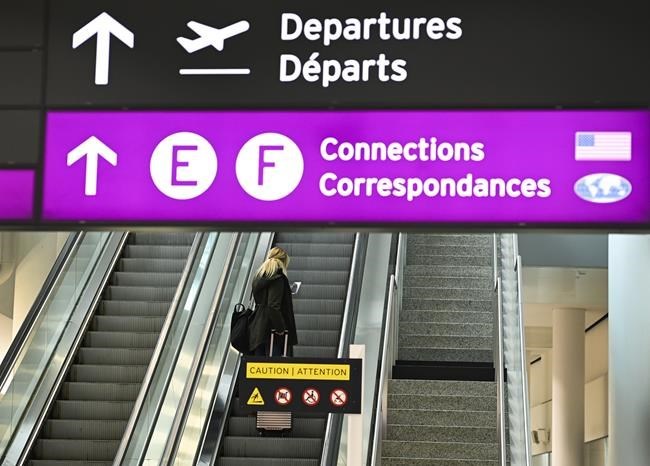MONTREAL — On a cool day in May at the Vancouver airport last year, Heather Walkus found herself stuck on the curb without assistance for nearly an hour.
Eventually an Air Canada employee guided Walkus, who is blind and living with multiple sclerosis, to the check-in counter and escorted to her gate, but she was stuck waiting alone again after her flight to Penticton, B.C., was delayed.
"I spent four hours alone in a wheelchair, blind, without anybody checking on me," she said. "I couldn't go to the bathroom. I couldn't eat. I couldn't find anybody to help me.
"Then they expected me to be able to get up out of the chair and climb up stairs onto my flight. It was ridiculous," said Walkus, who heads the Council of Canadians with Disabilities.
"It's like I was parked luggage," she said. You're just dumped and left.”
Walkus is among the accessibility advocates to come forward this week about unreliable assistance in air travel, pointing to regulatory gaps and scattershot enforcement that can leave travellers with disabilities injured, stranded or demeaned.
Community leaders describe mangled mobility aids, seemingly untrained staff and a check-in and boarding process akin to a slow-motion relay that shuttles passengers from one point to another, sometimes with hours-long waits and no assistance.
The criticism comes after Air Canada pledged to roll out new measures that improve the experience for hundreds of thousands of travellers living with a disability.
In Ottawa, Transport Minister Pablo Rodriguez summoned Air Canada CEO Michael Rousseau for a sit-down Thursday following reports of passenger mistreatment, including an incident where a man with spastic cerebral palsy was forced to drag himself off of an airplane due to a lack of assistance.
Yet the problems go beyond a single airline, as "gaping holes" in the Accessible Canada Act allow problems to persist in areas ranging from consultation to assistance protocols, Walkus said — despite a regulatory overhaul in 2020 brought on by that legislation.
On top of a dearth of detail on how to train staff, she cited the example of a rule requiring federally regulated companies to involve people with disabilities in developing policies, programs and services — a "regulation you could drive a truck through."
"You could send the administrator down to Tim Hortons and talk to someone in a wheelchair and you've consulted with the disability community. It's a check-off,'' she said. The group she heads was not contacted by Air Canada on its new accessibility blueprint, she added.
Francine Leduc, president of a Quebec-based group of accessibility advocates known as RAPLIQ, said existing rules aren't so much the problem; applying them in good faith is. Equal protection under the law regardless of "sex, age or mental or physical disability" has been enshrined in the Charter of Rights and Freedoms since that provision took effect in 1985, with stacks of legislation and regulations to flesh it out since.
Statistics Canada found that 63 per cent of the 2.2 million people with disabilities who used federally regulated transportation in 2019 and 2020 faced a barrier.
Service for the hundreds of thousands of passengers who fly in Canada each year isn't always terrible. It's the lack of consistency — and the angst each trip brings as a result — that many find so frustrating.
"I have gotten everything, from people who know what they're doing, to people who obviously had no training," said David Lepofsky, visiting research professor of disability rights at Western University's law faculty.
"I have to teach them how to guide a blind person."
He questioned why Air Canada's new director of accessibility reports to a lower level of management rather than directly to the CEO.
“That is a formula for ineffectiveness," said Lepofsky, who heads the Accessibility for Ontarians with Disabilities Act Alliance.
Announced Thursday, Air Canada's new measures range from implementing annual, recurrent training in accessibility for its 10,000-odd airport employees, to including mobility aids in an app that can track baggage.
Leduc said she was skeptical and criticized the language as vague, while Lepofsky said that merely improving service fell short of barrier-free travel. Damaged mobility aids should be treated with the same zero-tolerance approach as safety breaches, he said.
He also slammed the Canadian Transportation Agency as being "asleep" on accessibility enforcement.
However, Walkus said she took heart in recent steps from the regulator's chairwoman, France Pégeot, who accepted the top spot in June 2021.
"Their understanding of equity and inclusion has shifted the way CTA looks at how business must be done with people with disabilities," she said, noting Pégeot's inclusion of advocates in discussions with smaller airlines.
For now, problems remain, tinged with a hint of hope.
Last summer, Walkus arrived in Winnipeg on an Air Canada flight to find that the mobility aid she'd checked in Halifax hadn't made it past the layover in Toronto. And when it turned up two days later, it was damaged, she said.
"What we want is just to be able to travel without being harmed and delayed and held hostage because our wheelchair didn't show up," Walkus said, calling for an inquiry into subpar assistance.
"We're looked at as an alien group that has to be dealt with. It's really a demeaning process.
"The attitudinal part is going to be the biggest shift," she added, "but I've seen shifts already."
This report by The Canadian Press was first published Nov. 10, 2023.
Companies in this story: (TSX:AC)
Christopher Reynolds, The Canadian Press





